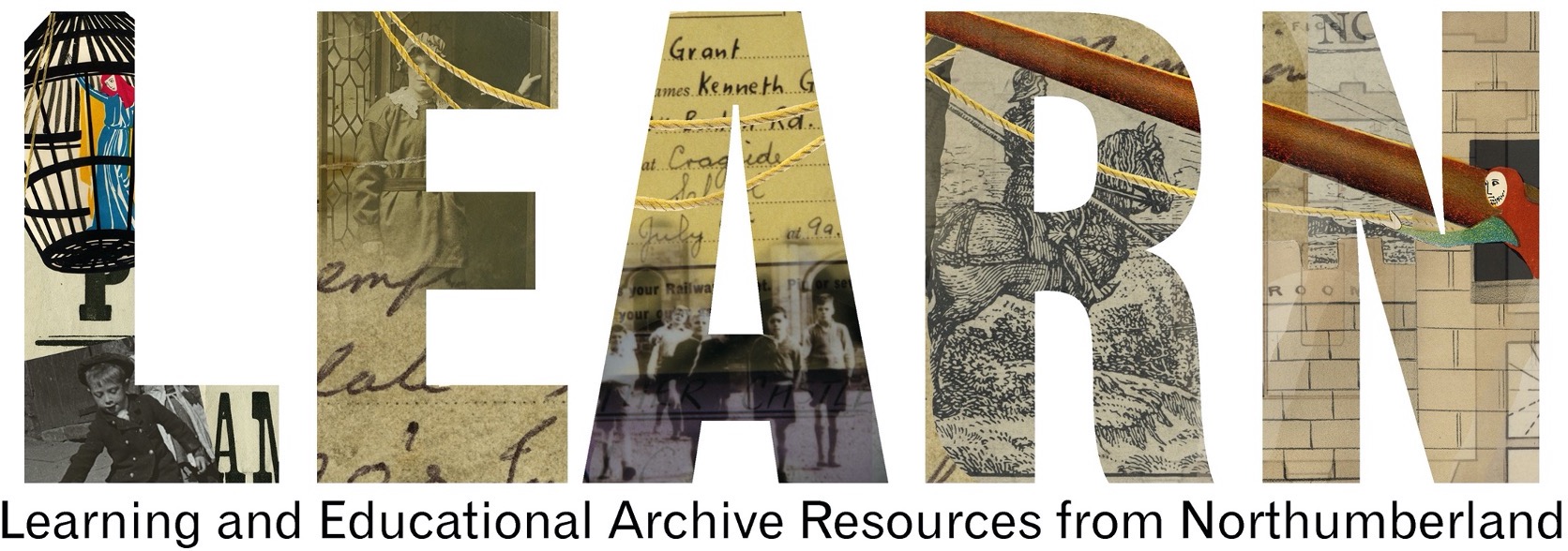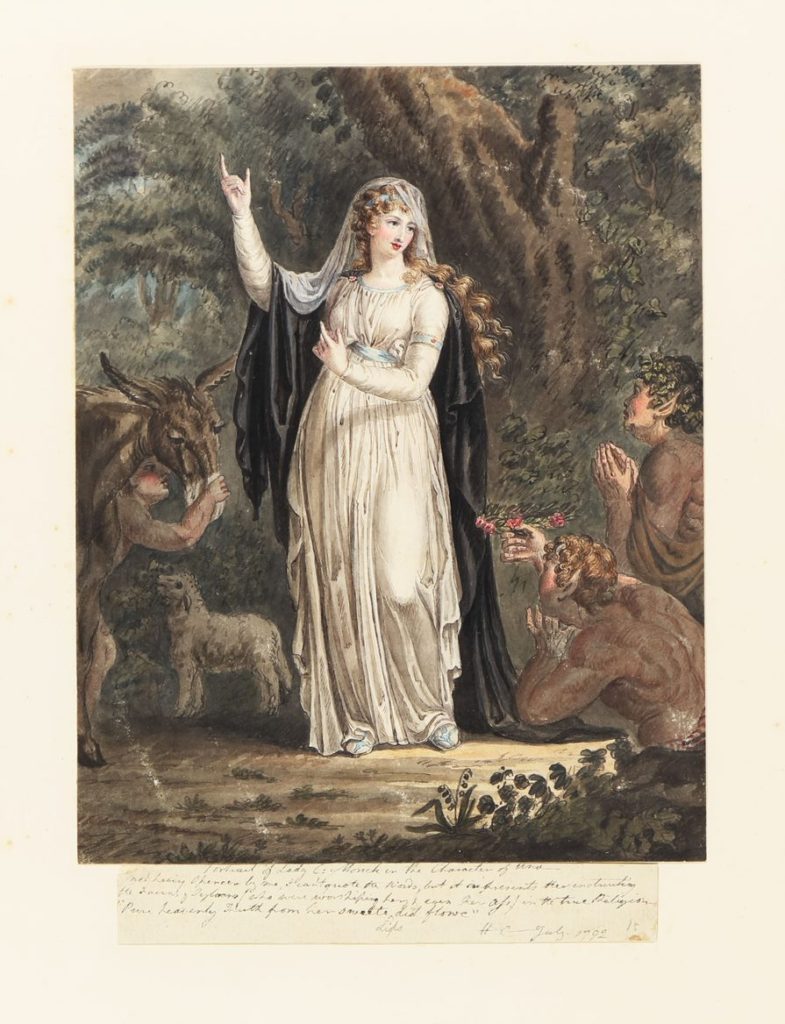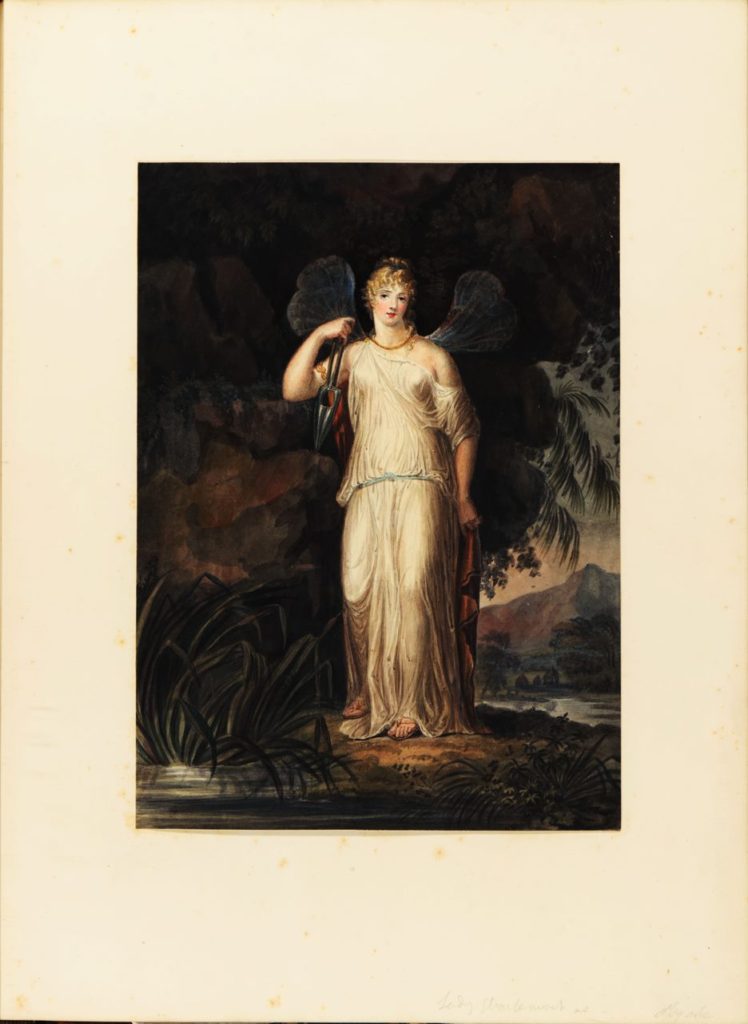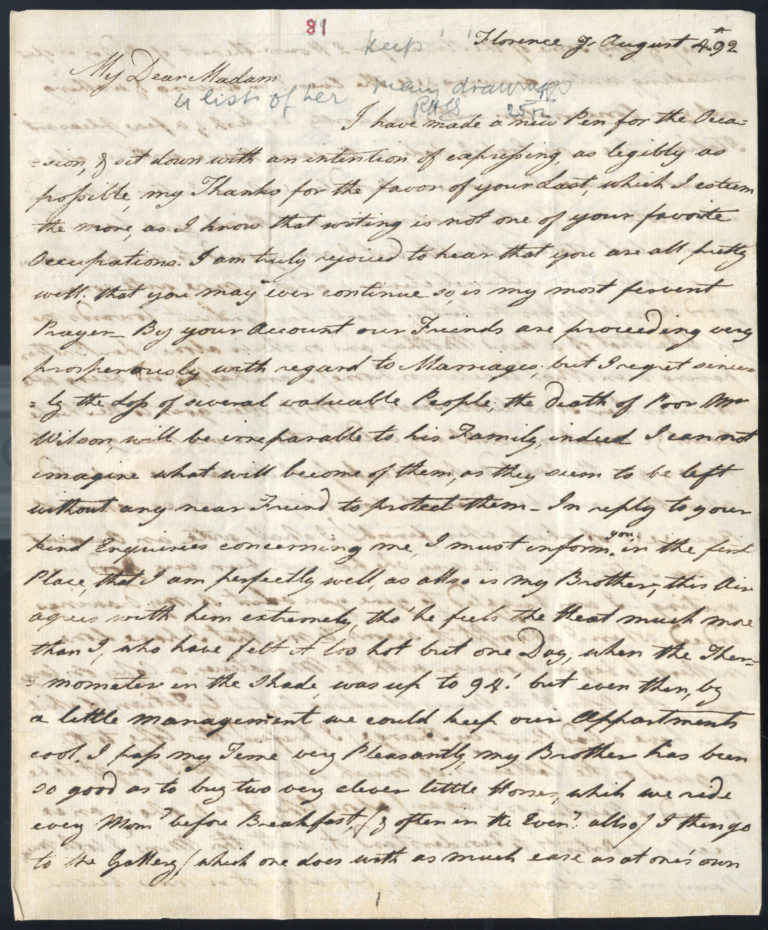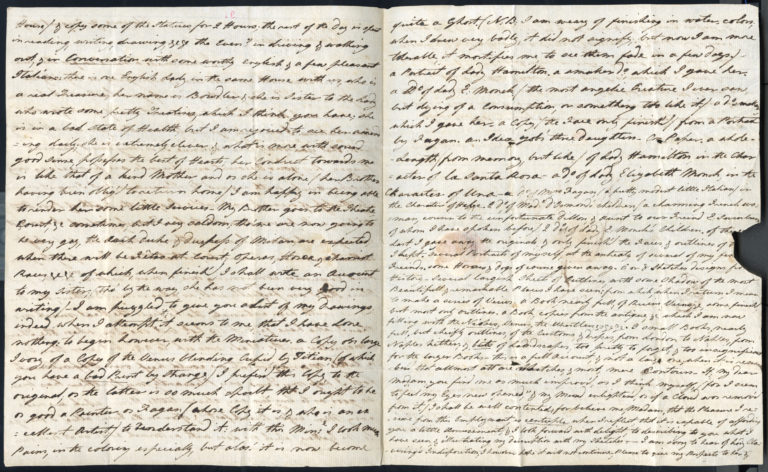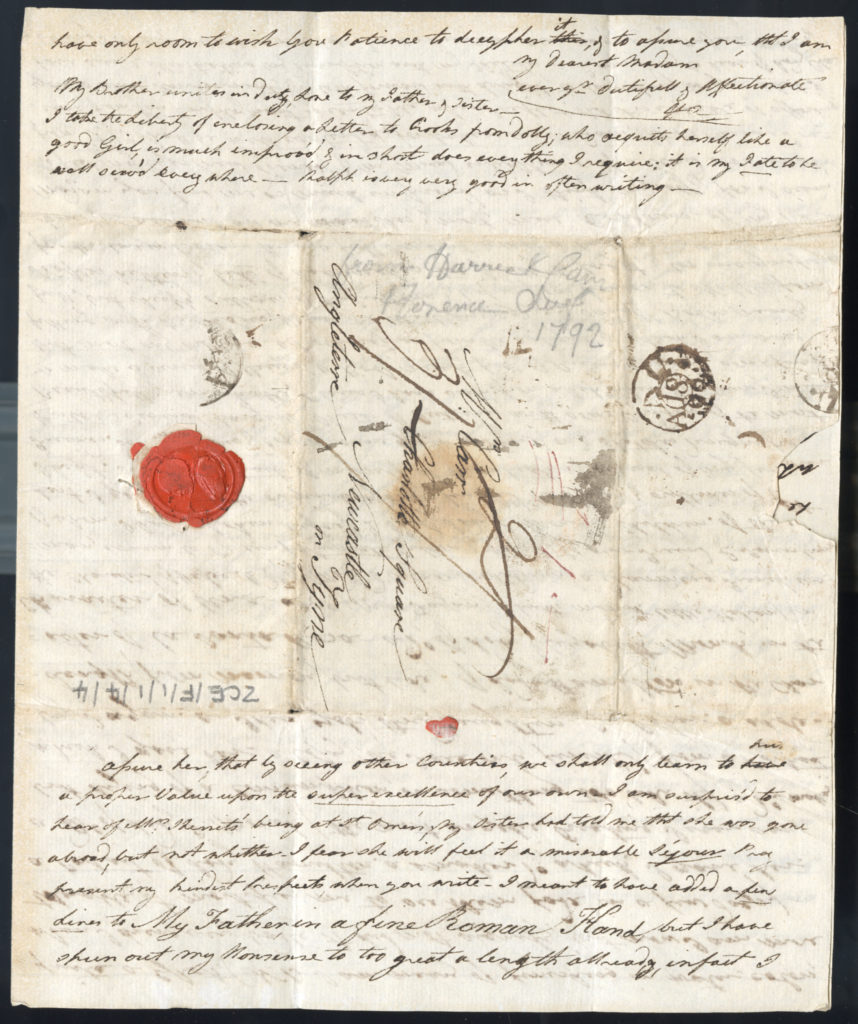Letter From Harriet Carr About Her Paintings, 1792
Reference: ZCE F/1/1/4/4
Topics: Portraiture, The Grand Tour, Travel Writing, Arts & Culture
LETTER FROM HARRIET CARR TO ISABELLA CARR
Harriet opens the letter by writing that she has ‘made a new Pen for the Occasion’. This would be a quill pen generally made from the discarded flight feathers of a goose or possibly a peacock or swan. She then goes on to comment on the news of family and friends reported in her mother’s last letter. Harriet then describes how she and her brother, John Carr, cope with the heat telling her that one day ‘the Thermometer in the shade, was up to 94!’. The possibility of heatstroke was another potential peril of The Grand Tour.
Harriet then describes her routine in Florence. She writes my Brother has been so good as to buy two very clever little Horses, which we ride every Morn[in]g before Breakfast, (& often in the Even[in]g also). Much of Harriet’s time is taken up with her interest in art. ‘I then go to the Gallery (which one does with as much ease as at one’s own House) & copy some of the Statues for 2 Hours; the rest of the day is spent in reading, writing, drawing’. The Gallery was the Uffizi, one of the must-see sights for the Grand Tourist in Florence. It was originally commissioned by the Dukes of Florence, the Medici family, as the offices of the magistrates of the city. Later in the 16th century, the first gallery was built to display art treasures collected by the Medici family. Harriet visited the Uffizi to study and draw both painting and statues. In the letter Harriet lists some of the paintings she had made, a combination of copies of paintings she has viewed, places she has visited and portraits of people she has met on the Tour. She makes specific reference to a Titian painting ‘Venus blinding Cupid’, probably Venus Blindfolding Cupid, now in the Borghese Gallery in Rome. Reference to the artist, Fagan, and to his Italian wife. This was Robert Fagan, an artist and archaeologist who also ran a business buying antiquities, some of doubtful provenance, and selling them on to Grand Tourists.
The subjects of Harriet’s portraits are listed as Lady Hamilton, Lady Elizabeth Monck and her children, Mrs Fagan and Mad[am] D’Osmond’s children. Harriet refers to giving paintings to her subjects but she did retain a number of them and some survive amongst the paintings brought back to England by Harriet. These include portraits of Lady Emma Hamilton (1765-1815), wife of Sir William Hamilton, the British Ambassador to Naples, who was to become the mistress of Lord Nelson and of Elizabeth Monck and her children. Elizabeth Monck is thought to be Lady Elizabeth Arminta Gore (1770-1845) who married Henry Monck. Two portraits of Lady Monck survive amongst the items brought home. Both ladies are depicted as classical figures, Elizabeth Monck as Psyche, the Greek goddess of the soul, and Una, probably a reference to the character in Edmund Spenser’s epic poem The Faerie (Fairy) Queen.
The letter gives a sense of the pleasure that drawing and painting bring to Harriet ‘…I seem to “feel my Eyes new opened”, & my mind enlighten’d, as if a Cloud was remov’d from it,) I shall be well contented: for believe me, Madam, that the Pleasure I receive seen, & illustratinge from this Employment, is centuple when I reflect that it is capable of affording you a little Amusement, & I look forward with delight, to describing to you what I have seen, & illustrating my description with my Sketches’. Harriet also writes about improving her artistic skills, a theme that runs through several of her letters.
ADDITIONAL RESOURCES
Letter from Harriet Carr, Florence, Italy, to her mother Isabella Carr, 4th August 1792.
Florence August 4th [17]92
My Dear Madam
I have made a new Pen for the Occasion, & sit down with an intention of expressing, as legibly as possible, my Thanks for the favor of your Last, which I esteem the more, as I know that writing is not one of your favorite Occupations. I am truly rejoiced to hear that you are all pretty well; that you may ever continue so, is my most fervent Prayer. By your Account our Friends are proceeding very prosperously with regard to Marriages; but I regret sincerely the Loss of several valuable People; the death of Poor Mr Wilson, will be irreparable to his Family; indeed I cannot imagine what will become of them, as they seem to be left without any near Friend to protect them. In reply to your kind Enquiries concerning me, I must inform you in the first Place, that I am perfectly well, as allso is my Brother; this Air agrees with him extremely, tho’ he feels the Heat much more than I, who have felt it too hot but one Day, when the Thermometer in the shade, was up to 94! but even then, by a little management we could keep our Appartments cool. I pass my Time very Pleasantly, my Brother has been so good as to buy two very clever little Horses, which we ride every Morn[in]g before Breakfast, (& often in the Even[in]g allso). I then go to the Gallery (which one does with as much ease as at one’s own House) & copy some of the Statues for 2 Hours; the rest of the day is spent in reading, writing, drawing, &c &c the Even[in]g in driving & walking out, & in Conversation with some worthy English, & a few pleasant Italians: there is one English Lady in the same House with us, who is a real Treasure; her name is Bowdler, & she is Sister to the Lady who wrote some pretty Treatises, which I think you have; she is in a bad state of Health, but I am rejoiced to see her amending daily; she is extremely clever & what is what is more, with sound good Sense, possesses the best of Hearts; her Conduct towards me is like that of a kind Mother, and as she is alone (her Brother having been oblig’d to return home)I am happy in being able to render her some little Services. My Brother goes to the Theatre, Court, &c sometimes; but I very seldom; tho’ we are now going to be very gay, the Arch Duke & Duchess of Milan, are expected, when there will be Fêtes at Court, Operas, Horse & chariot Races, &c &c of which, when finish’d, I shall write an Account to my Sister;(tho’ by the way, she has not been very good in writing). I am puzzled to give you a List of my Drawings; indeed when I attempt it, seems to me, that I have done nothing: to begin however, with the Miniatures. a Copy on large Ivory, of a Copy of the Venus blinding Cupid, by Titian, (of which you have a bad Print by Strange;) I prefer’d this Copy to the original, as the latter is so much spoilt, that I ought to be as good a Painter as Fagan, (whose Copy it is, & who is an excellent Artist) to understand it: with this Min[iatur]e I took much Pains, in the coloring especially, but alas! it is now become quite a Ghost. (N.B. I am weary of finishing in water-colors; when I drew very badly, it did not signify; but now I am more tolerable, it mortifies me to see them fade in a few days.) a Portrait of Lady Hamilton. a smaller D[itt]o, which I gave her. a D[itt]o of Lady E. Monck (the most angelic Creature I ever saw but dying of a Consumption, or something too like it.) a D[itt]o smaller which I gave her. A Copy (the Face only finish’d) from a Portrait by Fagan. an Idea, Job’s three Daughters. On Paper a whole-Length (from memory, but like) of Lady Hamilton, in the Character of la Santa Rosa. a D[itt]o of Lady Elizabeth Monck, in the Character of Una. a D[itt]o of Mrs fagan, (a pretty modest little Italian) in the Character of Hebe. 2 D[itt]o of Mad[am] D’Osmond’s children (a charming French woman, cousin to
the unfortunate Dillon, & aunt to our Friend E[dward] Swinburne of whom I have spoken before.) 2 D[itt]o of Lady E Monck’s Children. of the[se] Last I gave away the originals & only finish’d the Faces & outlines of t[hose] I kept. several largish Sheets of Outlines, with some Shadow, of the most Beautifull & remarkable Places I have seen: from which, when I return, I mean to make a series of Views. a Book, nearly full, of Ruins, Views, &c. Some finishd but most only outlines. a Book, copies from the antique, &c which I am now filling with the Niobes, Venus, the Wrestlers &c &c &c. 3 small Books, nearly full, but chiefly outlines, of the Customs, & dresses, from London to Naples, from Naples hither; & bits of Landscapes, too pretty to forget, & too insignificant for the larger Books – this is a full Account, & not a large one; when it is remember’d that allmost all are sketches, & most, mere Contours. If, my dear Madam, you find me as much improv’d, as I think yself, (for I seem to “feel my Eyes new opened”, & my mind enlighten’d, as if a Cloud was remov’d from it,) I shall be well contented: for believe me, Madam, that the Pleasure I receive seen, & illustratinge from this Employment, is centuple when I reflect that it is capable of affording you a little Amusement, & I look forward with delight, to describing to you what I have seen, & illustrating my description with my Sketches. I am sorry to hear of Lady Clavering’s Indisposition, I however hope it will not continue, Please to give my Respects to her & assure her, that by seeing other Countries, we shall only learn to put a proper Value upon the super excellence of our own. I am surpris’d to hear of Mrs Skerrit’s being at St Omer’s; my Sister had told me that she was gone abroad, but not whither. I fear she will feel it a miserable Séjour Pray present my kindest Respects, when you write. I meant to have added a few Lines to My Father, in a Roman Hand, but I have spun out my Nonsense to too great a length allready, infact I have only room to wish You Patience to decipher it, & to assure you, that I am my Dearest Madam ever y[ou]r Dutifull & Affectionate H[arriet] C[arr]
My Brother writes in duty & Love to my Father & Sister. I take the Liberty of enclosing a Letter to Crooks from Dolly; who acquits herself like a good Girl, is much improv’d, & in short does everything I require: it is my Fate to be well serv’d every where. Ralph is very very good in often writing.
The Grand Tour and the Carr Family
Art Treasures in the North: Northern Families on the Grand Tour by Anne French (Unicorn Publishing Group, 2000)
John and Harriet Carr: A Brother and Sister from The North-East on The Grand Tour by Bill Purdue (Northern History, vol. 30, no. 1, 1994)
The British Abroad: The Grand Tour in the Eighteenth Century by Jeremy Black (The History Press, 1992)
Italy and the Grand Tour by Jeremy Black (Yale University Press, 2010)
Ladies of the Grand Tour by Brian Dolan (Flamingo, 2010)
Georgiana, Duchess of Devonshire
Georgiana Duchess of Devonshire by Amanda Foreman (Harper Collins, 1998)
Lady Emma Hamilton
Beloved Emma: The Life of Emma, Lady Hamilton by Flora Fraser (Bloomsbury, 2012)
England’s Mistress: The Infamous Life of Emma Hamilton by Kate Williams (Arrow, 2007)

